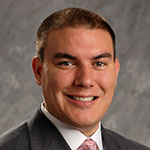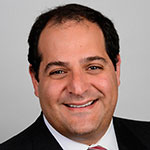It seems that every time Pilar Cruz gets a promotion, it comes with not only a new title, but a new address as well. Since joining agribusiness giant Cargill in 2002, the Colombia-born executive has held eight different positions based in five different countries, not to mention extended assignments in several others. It hasn’t been easy, but she was destined for the traveler’s life.
“My dad was an executive in the Federal Reserve of Colombia, and he used to travel for business,” says Cruz. “He would always tell me stories when he came home. I was fascinated by his experiences and the way he talked about working in Europe, China, and North America.” That sense of wanderlust has stayed with Cruz. She left her native Bogotá, Colombia in 2000 and has since lived all over the world, becoming a specialist at acclimating to different cultures. Her current position is president and business unit leader of Cargill Meats Europe, supplier of poultry products to retail, food-service, and food-manufacturing customers across Europe.
Cargill is the largest private company in the world, employing 142,000 people in 67 countries. “Even though Cargill is not that prominent in Colombia, I did a lot of research before accepting their offer, and I was fascinated by the global footprint of the company,” says Cruz. “I wasn’t sure if I wanted to go back to South America or work overseas for a while, so it seemed like a great place for me to start.”
After getting her MBA at the University of Michigan, Cruz began her Cargill tenure in Chicago as a business analyst. She has ascended to senior management through numerous lines of business and across various geographies—including the United States, Brazil, Canada, Costa Rica, Nicaragua, the United Kingdom, France, and Russia. Here, she shares with HE a few cultural insights she has gained, living and working on both sides of the Atlantic.
North America
In the United States, Cruz has worked in Chicago, Minneapolis, and Oklahoma City. In Canada, she has held posts in Edmonton and Alberta. Although the pace of life is slower in Canada than in the states, she says the culture is similar.
“I had the benefit of going through a cultural awareness class at the University of Michigan,” Cruz says. “I came from a Latin American country, where you could refer to people as ‘la gorda’—‘the fat lady’— or ‘el calvo al fondo’— ‘the bald guy in the back.’ You can’t do that in the United States.”
Some people might call it political correctness. Others might call it sensitivity. Either way, Cruz says, it’s important when you’re doing business with North American companies. “For me, that sensitive approach and respect for all people is the number one strength in North America.”
Another strength in the United States in particular, is the emphasis on hard work. “If you want to be successful in the US, you need a certain drive and determination. [Americans] have an intensity in the way they work,” Cruz says.
South America
If North America is about respecting diversity, South America is about respecting authority, according to Cruz. Of her native Colombia, for instance, she says, “It’s very hierarchical.”
The hierarchy means that employees rarely challenge senior managers directly. “In the US there’s a lot more feedback,” Cruz says. “Even if you’re reporting to me, I’m open to hearing your feedback and changing my approach. I want to be challenged. That upward feedback is slowly changing, in South America, but it’s not there yet.”
Although there are female leaders in certain industries—banking, for instance—it’s important to realize that many industries in South America, such as manufacturing, remain dominated by men. “It can be a very male-oriented business culture and approach,” Cruz says.
Central America
Between 2011 and 2013, Cruz spent about a year working in Costa Rica and another year in Nicaragua. Unlike South America, which is very “suit and tie,” she says, Central America, in general, is “more informal and casual.”
“There’s less structure and a more lax approach to time,” Cruz explains. “A meeting scheduled for 9 a.m. easily can start at 9:15 or 9:30. And there’s nothing wrong with that. You just have to get used to it.”
According to Cruz, the relaxed pace is one of the only business approaches Costa Rica and Nicaragua have in common. While the former is very open, the latter is quite closed. “Tourism is the number one industry in Costa Rica, so there is a lot of influence from the American culture and companies,” Cruz says. “Nicaragua is the opposite. It’s more isolated.”
In Nicaragua, in particular, politics are social currency. “Politics play a very critical role in how you do business,” Cruz says. “You have to know the various high-level ministers [e.g., agriculture, economics, transportation, etc.] to start a discussion in Nicaragua.”
Europe
In her current position, Cruz spends most of her time in the United Kingdom, where people are friendly, yet reserved. Knowing about sports helps. “It’s useful to know a little about rugby, cricket, and soccer,” Cruz explains. “People talk about sports, but not as much about their families. In the US or Latin America there’s a lot of chitchat when you’re doing business, but in Europe they’re a private. It’s more formal.”
In addition to the United Kingdom, Cruz frequently visits Cargill operations in France and Russia—the latter of which, she says, is unlike any other country she’s visited. “It’s a fascinating place; there is a lot of development and growth, but it’s very cold,” Cruz explains. “I don’t know if it’s the climate, the history, or the politics, but it’s much more challenging to develop a friendly relationship. So far, it has been transactional and not personal, which is different from most places I’ve been.”
Executives who can transition between so many different cultures are positioned for unique opportunities within best-in-class companies, according to Cruz. “In order to be an effective leader in today’s global environment, it is important to be exposed to different cultures and be able to effectively lead businesses in multiple countries,” she says. “The world is becoming more connected, and the ability to understand a diverse set of cultures is a competitive advantage. A global company like Cargill understands that it is important to provide leaders with these types of experiences and to position them for long-term success.”

